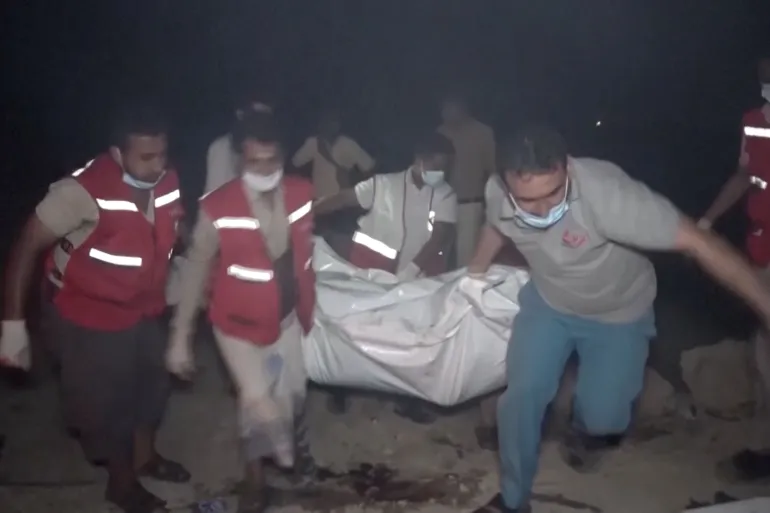
While US attacks sow death in Yemen, the world once again ignores our suffering.
In the first week of April, the United States carried out air strikes throughout the Yemen. An attack occurred to just one street in my family’s house in a quiet neighborhood of the port city of Hodeida. As always happens with sudden attacks, it all happened quickly: the sound of the explosion, the tremendous house, the children shouting, and the difficulty in understanding what was happening.
Ten years have passed since the beginning of the war in Yemen. The coalition’s air attacks ceased, but Israeli and Americans bombings took control. Now it seems that we are in a video game and we go up to face another monster – much fiercer than the previous one.
I thought that surviving so many attacks would have helped us overcome fear. But I was wrong. The sound of this month’s explosion made my son, Tamim, run to my arms. We were all scared, but what I saw in my son’s eyes was pure terror. He does not remember the whole war. He is only six years old and is still discovering the world, which that day, in early April, showed him his ugly face.
He put his hands on the sides of my face, with his trembling fingers. So he whispered a difficult question: “Is this an earthquake?”
While everyone at home was busy trying to find out where the bomb had fallen, I sought in my mind an answer to my son’s question.
I smiled to try to calm him down, still thinking of an answer. Should I lie and say yes? Or should I explain the reality of war, fighter and missile? I must tell the truth: that the world has abandoned us to a constant and deadly bombing destination?
I told him it was not an earthquake, but a plane that had passed and launched a missile. I decided not to share with it the macabre details of what a missile does by landing in civil neighborhoods. I didn’t want to distort your passion for planes. Flying above the clouds was Tamim’s dream, and he had been saving his scarce allowance for one day to perform it.
Mention the plane relieved his fear and made him think of his flying machines. What really worries me is that one day my son will realize what to hear the sound of a plane really means in Yemen.
We soon found out what the target of the air strike was: a building next to a house I had already visited. It was the house of a close friend’s sister. I was taken by an anxious premonition and decided to call my friend, who lived in another city.
At the beginning of our conversation, I couldn’t convince myself to tell her what had happened. She looked so happy on the phone. But by my trembling voice, he realized that something was wrong. Unfortunately, I had to become the bearer of the terrible news.
Later, we heard that his nephew, an 18 -year -old named Mohamed, had been killed in the explosion. His biggest dream was to get a scholarship. He had returned home just an hour before the attack after attending classes at an English institute.
Mohamed might never imagine that the scholarship it would receive would be for another world and would not require any qualification other than being Yemeni.
He was quoted a few times in the news before he was forgotten.
Two weeks later, when I started writing these lines, the funerals of 80 people killed by a bombing in the port of Ras Isa were performed. The United States saw Porto as part of the fuel supply chain for the Ansa Allah group, but decided not to take into account the civil workers employed there.
Most returned to their families as charred bodies. Some didn’t even return – like 26 -year -old Abdel Fattah. Your body was not found. His surviving colleagues said he was where one of the missiles fell. When they searched him, there were no traces – neither phone, no shoes, no hair, nor a piece of skin. Abdel Fattah was sprayed.
This is the worst nightmare for a family: not having the body of a loved one lost to hug and mourn.
More days have passed. More air strikes hit Hodeidah. I cannot describe the intensity of the moments after the end of a bombing. Who will be the next victim? Where does death hide? People enter Frenzy calling their loved ones. The simple decision to turn off the phone can leave a family panicked.
And yet, in the midst of all death and destruction, the Yemenis still find a way to demonstrate kindness and resilience. Often I hear people say that what we are suffering does not compare to what is happening in Gaza. My Yemeni compatriots see pain as a matter of comparison, not justice – as if the pain needed to compete with another to be recognized.
I often wonder: do we suffer from collective depression? Or do we have a supernatural power that allows us to adapt to this abominable resignation?
Whether air strikes increase or stop, there is nothing that can calm our hearts. This sadness accumulates in our bodies and makes us fear what is to come.
The Yemenis no longer pay attention to the rest of the world, which has reduced us to mere numbers in reports from international agencies and news.
There is nothing more we can do but write. Perhaps writing can keep Mohamed’s memory alive, Abdel Fattah and hundreds of thousands of other Yemenis. Perhaps one day our writing can help stop the missiles.
Originally published by Al Jazeera on 4/27/2025
Por Manal Aled Alwent
The opinions expressed in this article are by the author and do not necessarily reflect the editorial position of Al Jazeera.
Source: https://www.ocafezinho.com/2025/04/28/iemen-o-alivio-perverso-de-nao-ser-gaza/

